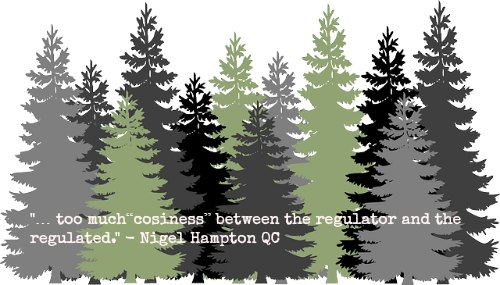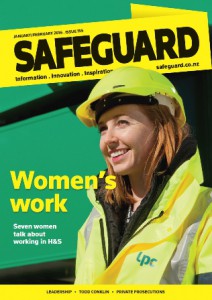Legal viewpoint—Going private
NIGEL HAMPTON says his experience prosecuting two forestry companies demonstrates the value of private prosecutions in holding the regulator to account.
Background - lessons learned from Pike River
First, some background. In a 50-plus year career in the law, until 2010 I had never practised in the field of health and safety, nor had I acted for any union. After the Pike River explosion I was approached to act for, and did act for, the union representing miners in front of the Pike River Royal Commission.
The knowledge and insights I gained from that experience were astounding in many respects, not the least being the paucity of Department of Labour (DoL) mine inspectors, the lack of experience and knowledge of mining in the DoL and its mines inspectorate, and DoL’s “hands off” approach to its regulatory responsibilities.
NZ Council of Trade Unions requests investigation
 In early 2014 I was asked to look at some North Island forestry deaths which had occurred in the preceding couple of years and which the families of the dead men believed had not been properly“handled and investigated by the relevant inspectors” from the DoL and/or that department’s successors.
In early 2014 I was asked to look at some North Island forestry deaths which had occurred in the preceding couple of years and which the families of the dead men believed had not been properly“handled and investigated by the relevant inspectors” from the DoL and/or that department’s successors.
The New Zealand Council of Trade Unions, (CTU) – mainly through Helen Kelly – had taken up the causes of the next-of-kin and wanted to look at some of these deaths to see if private prosecutions might be warranted, on the facts, and whether court leave would be likely to be granted to take such prosecutions, as a matter of law (the time limitation period having expired).
Results of investigation
...why had the regulator not acted and taken prosecutions?
On looking at two particular files (obtained by various Official Information Act (OIA) applications, and mainly consisting of DoL/WorkSafe files together with some Police documents) it became evident to me, and extremely quickly, that:
-
Health and safety failures by both employers were very apparent (and that the insult offered by the regulator to each of the families, namely that each of the dead workers was to blame for his own death, was wrong).
-
Leave could be obtained (and was).
-
To bring prosecutions (successfully in each as transpired) would require no further investigations, nor would further witnesses need to be located and interviewed.
This last matter encapsulated the most alarming feature to me. If all the materials on the regulator’s files showed clear Health & Safety breaches by the employers, and if no further investigations and interviews were required – all that was needed was some marshalling of both the materials and the witnesses and the application of legal experience, just logic and logistics really – if those two things were so apparent, why had the regulator not acted and taken prosecutions?
Holding both regulator and the regulated to account
... too much“cosiness” between the regulator and the regulated
In accord with opinions I had formed through the Pike River inquiry, it seemed that it could be attributed to a combination of the regulator’s indifference, its incompetence, and the atrophy of specialist (institutional) knowledge within the regulator (decrepitude and ineptitude), plus too much“cosiness” between the regulator and the regulated. (Is the latter apparent throughout all New Zealand’s regulated activities, I wonder, or just a reflection of the closeness within two quite small fields – mining and forestry – where everyone in the field knows each other, and, apparently, well?).
Whatever the whys, the two cases were privately prosecuted, the courts agreed as to the breaches alleged, convictions entered and fines and reparations imposed.
The regulator was less than gracious, the forestry industry took notice (a salutary and hopefully deterrent effect, one of the major aims in taking the prosecutions) and the bereaved families given a measure of relief – to have the factual circumstances of their family member’s untimely and unnecessary death laid out in court, to public scrutiny, was cathartic, let alone the vindication of their views as to how the regulator had treated them and mistreated or disregarded the facts, for whatever reason, and had blamed, wrongly, their loved one instead – the regulator’s insult assuaged.
...the ability to take a private prosecution is an invaluable one
This experience has well and truly cemented in me the view that the ability to take a private prosecution is an invaluable one, which must be guarded and retained. My contact with the new regulator (especially in relation to the first forestry case heard) left me with real anxiety as to whether the lessons from the Pike report have truly been taken to heart, and whether the ethos and the practices and procedures of the inspectorate have changed much, if at all, from what was revealed in the Pike inquiry.
The ability to be able to take a private prosecution, hedged as it is with appropriate safeguards, is as vital now as when it was first instituted – it is one way, in my mind the best way, and possibly the only practical way to hold the regulator to the mark.
Nigel Hampton QC is one of New Zealand's leading barristers. Last year he celebrated the 50th anniversary of his admission to the bar.
 His article first appeared in the current issue of Safeguard magazine; New Zealand’s leading publication on workplace health and safety.
His article first appeared in the current issue of Safeguard magazine; New Zealand’s leading publication on workplace health and safety.
It is one of several free stories available in every issue.
More health and safety information
Now everything “Health and Safety” is conveniently located in one hub: the magazine Safeguard, other publications and resources, information about events, suppliers, jobs …
To find out more please visit: Safeguard OSH Solutions